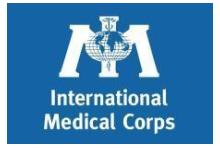Severe monsoon rains between August 15–18 triggered catastrophic flash floods and landslides across Khyber Pakhtunkhwa (KP) province, devastating lives and infrastructure in Bajaur, Battagram, Buner, Mansehra, Shangla, Swat and Torghar districts, killing more than 300 people in KP and 200 in Buner while sweeping away entire villages. Punjab province remains the epicenter of the disaster. More than 2 million people have been displaced, as relentless river overflows have submerged some 4,500 villages, washing away homes and farmland. In Khyber Pakhtunkhwa (KP) province, nortwest of Punjab, communities are grappling with heavy casualties, widespread infrastructure losses, and repeated monsoon spells that continue to intensify humanitarian needs. Across both provinces, floodwaters have destroyed agricultural land, threatening food security, while major rivers have reached dangerous levels.
To support flood-affected communities in Shangla and Buner, International Medical Corps has deployed four mobile medical teams (MMTs)—two in each district—to provide lifesaving health services. So far, we have conducted 5,170 outpatient consultations. Additionally, the Mental Health and Psychosocial Support team has conducted 88 individual counseling sessions and 35 group sessions, reaching 375 people with emotional support, stress management techniques and coping strategies that help flood-affected community members recover from trauma and strengthen their well-being. Our teams have also completed the procurement of essential medicines, dispatched supplies to the target districts and donated critical drugs to the Department of Health in Buner to help address urgent healthcare needs. The donated supplies include antibiotics, analgesics, antifungals, intravenous fluids, oral rehydration salts, antiseptics, micronutrient supplements and vaccines, among other items necessary to reduce the risk of disease outbreaks in the aftermath of the floods.
Thanks to our longstanding presence in the KP province, International Medical Corps is prepared to expand its response, which may include distributing additional supplies to affected health facilities and communities, deploying mobile medical teams, and more. Your support can help deliver urgently needed medical care and supplies to affected communities in Pakistan as they recover from this disaster.
*Please note for recurring donations: Once we have determined that the community can continue to respond to the after-effects of this emergency without us, we will scale back our response efforts. At that time, we will redirect your future donations where they are needed most to help us respond to future outbreaks of conflict, disease or disaster.
